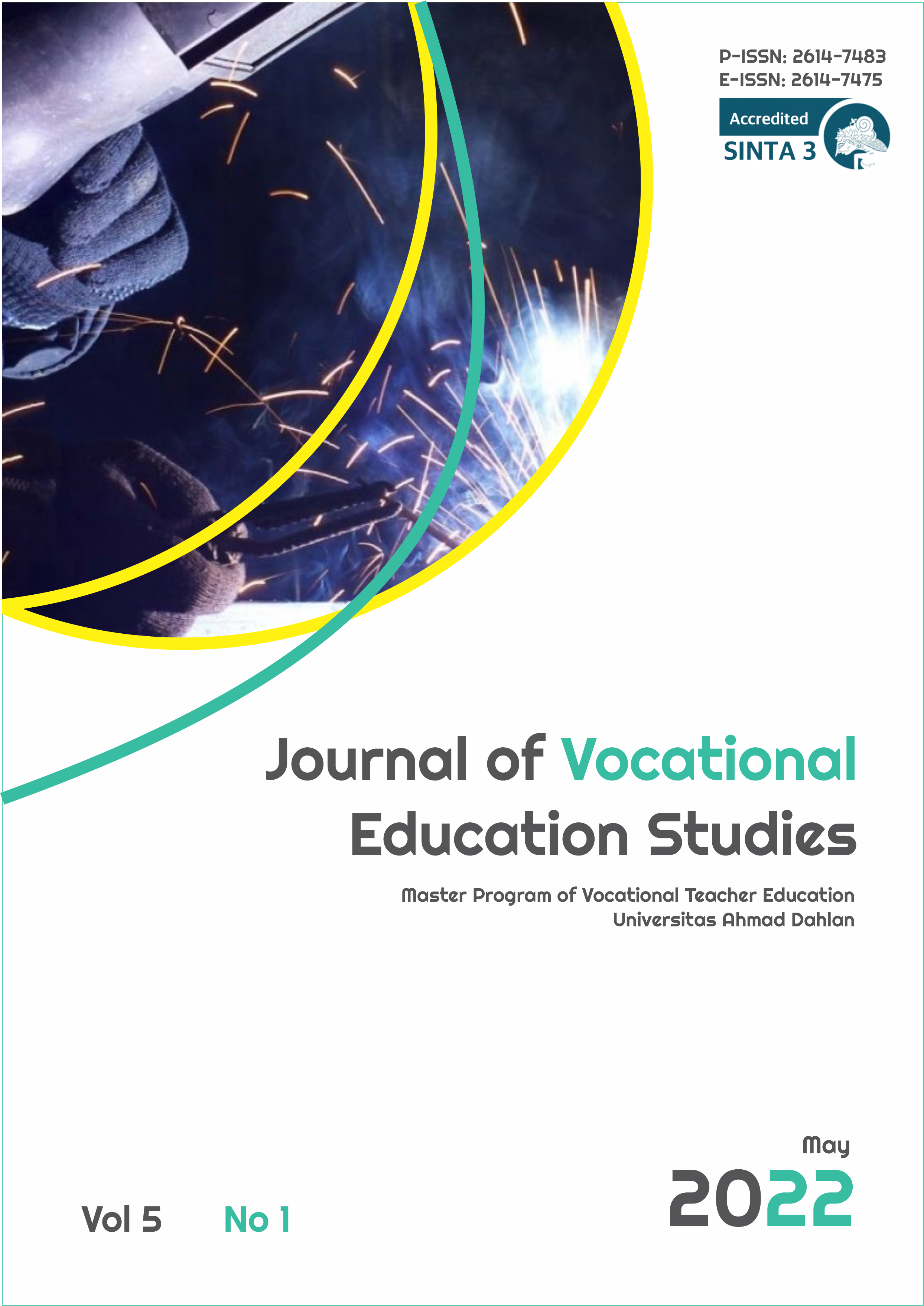Psychological Effect of Distance Learning during the COVID-19 Pandemic on Accounting Practicum Lesson
DOI:
https://doi.org/10.12928/joves.v5i1.4485Keywords:
distance learning, COVID-19, educational psychologyAbstract
This study aims to scrutinize the psychological effects of students participating in distance learning during the COVID-19 pandemic in accounting practicum lessons. The research employed a qualitative approach, with a type of single instrumental case study. Data collected were validated using data (sources) triangulation techniques. Data were then analyzed by the qualitative method of Miles and Huberman models (interactive models). The results revealed that distance learning affected students psychology. The psychological effects felt by students, among others, were that distance learning felt less than maximal, less fun, boring, making academic stress, and disappointing. In addition, because distance learning was done at home, students focus and concentration were easily distracted with other things, and student learning motivation fluctuated. Regarding time management, some students could do it, and some others encountered difficulties. A feeling of anxiety and depression was experienced by some students, while others could control them. However, apart from those, distance learning made learning not tense and provided sufficient time for students to relax and refresh.
References
Ansyah, E.,H., Muassamah, H., & Hadi, C. (2019). Tadabbur Surat Al-Insyirah untuk Menurunkan Stres Akademik Mahasiswa. Jurnal Psikologi Islam dan Budaya, 2(1), 9-18.
Arsana, I., K., S. (2019). Pengaruh Keterampilan Mengajar Guru dan Fasilitas Belajar Terhadap Motivasi Belajar Siswa. SOSIAL HORIZON: Jurnal Pendidikan Sosial, 6(2), 269-282.
Budiywono, E. (2017). Pengaruh Variasi Metode Mengajar Guru PAI Terhadap Motivasi Belajar Siswa Kelas VIII Semester Genap SMPN 3 Satu Atap Siliragung Banyuwangi Tahun Pelajaran 2015/2016. Jurnal Darussalam: Jurnal Pendidikan, Komunikasi Dan Pemikiran Hukum Islam, 8(2), 259-279.
Creswell, J. W. (2013). Qualitative Inquiry & Research Design: Choosing Among Five Approaches, Third Edition (terjemah). Beverly Hills: SAGE Publications, Inc.
Emzir. (2010). Analisis Data: Metodologi Penelitian Kualitaitf. Jakarta: Rajawali Pers.
Fahrudin, A. R., (2020, 29 November). Permasalahan dan Solusi Pembelajaran Jarak Jauh di Masa Pandemi Covid-19. Diperoleh 29 Maret 2021, dari https://sapos.co.id/20-20/11/29/permasalahan-dan-solusi-pembelajaran-jarak-jauh-di-masa-pandemi-covid19-/#:~:text=Permasal-ahan%20pembelajaran%20jarak%20jauh%20diantaranya,pembela-jaran%20jarak%20jauh%2C%20dan%20kesulitan.
Fitri, S. (2020). Dampak Positif dan Negatif Sosial Media Terhadap Perubahan Sosial Anak. NATURALISTIC : Jurnal Kajian Penelitian Pendidikan dan Pembelajaran, 1(2), 118-123.
Govaerst, S. & Gregoire, J. (2004). Stressful Academic Situstions : Study on Appraisil Variables in Adolescence. British Journal of Clinical Psycology, 54, 261-271.
Gunawan, I. (2015). Metode penelitian Kualitatif: Teori dan Praktik. Jakarta: PT Bumi Aksara.
Halawa, M., V., B. (2021). Efektivitas Pemanfaatan Platform Media Sosial dalam Pembelajaran Praktikum Secara Daring. Attractive : Innovative Education Journal, 3(1). 52-64.
Handayani, L. (2020). Keuntungan, Kendala dan Solusi Pembelajaran Online Selama Pandemi Covid-19: Studi Ekploratif di SMPN 3 BAE Kudus. Journal of Industrial Engineering & Management Research, 1(2), 15-23.
Harlina, A., Suharso, S., & Sri Hartati, M. (2014). Mengembangkan Kemampuan Manajemen Waktu Melalui Layanan Penguasaan Konten dengan Teknik Kontrak Perilaku. Indonesian Journal of Guidance and Counseling: Theory and Application, 3(1), 1-8.
Iskandar, L., & Zulkarnain. (2013). Penyesalan Pasca Pembelian Ditinjau dari Big Five Personality. Jurnal Psikologi, 40(1), 81-91.
Komarudin. (2008). Dakwah dan Konseling Islam Formulasi Teoritis Dakwah Islam Melalui Pendekatan Bimbingan Konseling. Semarang: Jurusan BPI Fakultas Dakwah IAIN Walisongo.
Mahmudah, F., N. & Santosa, B. (2021). Vocational School Alignment Based-on Industry Needs. JOVES (Journal of Vocational Education Studies), 4(1), 36-45.
Moleong, L. J. (2017). Metodologi Penelitian Kualitatif. Bandung: PT Remaja Rosdakarya Offset.
Mulyadi, Y. (2017). Pembelajaran Menyenangkan di Sekolah Menengah. Jurnal Kependidikan, 18 (1), 1-16.
Ormrod & Jeanne, E. (2009). Psikologi Pendidikan (Membantu Siswa Tumbuh dan Berkembang).Jakarta: Erlangga.
Patton, M. Q. (1987). Qualitative Evaluation Methods. Beverly Hills: SAGE Publications, Inc.
Pawicara, R., & Conilie, M. (2020). Analisis Pembelajaran Daring terhadap Kejenuhan Belajar Mahasiswa Tadris Biologi IAIN Jember di Tengah Pandemi Covid-19. ALVEOLI: Jurnal Pendidikan Biologi, 1(1), 29-38.
Rahmawati, I., & Yulianti, D. (2020). Kreativitas guru dalam proses pembelajaran ditinjau dari penggunaan metode pembelajaran jarak jauh di tengah wabah COVID-19. AL-ASASIYYA: Journal Of Basic Education, 5(1), 27-39.
Riyandi, A., Aulianita, R., Wiyatno, A., Triantori, V., & Musyaffa, N. (2020). Pemanfaatan Teknologi untuk Pembelajaran Jarak Jauh di Masa Pandemi Covid-19. Jurnal AbdiMas Nusa Mandiri, 2(2), 37-42.
Schukajlow, S., & Pekrun, K., R., R. (2017). Emotions and Motivation in Mathematics Education : Theoretical Considerations and Empirical Contributions. ZDM, 49(3), 307-322.
Setiyawan, A & Kurniawan, A. (2021). The Effect of Pandemic Covid-19 into Internship Activity of Mojokerto Vocational High Schools. JOVES (Journal of Vocational Education Studies),4(1), 125-130.
Trinova, Z. (2012). Hakikat Belajar dan Bermain Menyenangkan Bagi Peserta Didik. Al-Ta lim Journal, 19(3), 209-215.
Yuliawati, D. R. (2021). Optimalisasi Aplikasi Whatsapp Dan Google Meet Untuk Penyampaian Materi Pada Pembelajaran Jarak Jauh. WASIS: Jurnal Ilmiah Pendidikan, 2(1), 62-67.
Downloads
Published
Issue
Section
License
Copyright (c) 2022 Universitas Ahmad Dahlan

This work is licensed under a Creative Commons Attribution-ShareAlike 4.0 International License.
Authors who publish with Journal of Vocational Education Studies (JOVES) agree to the following terms: Authors retain the copyright and grant the Universitas Ahmad Dahlan right of first publication with the work simultaneously licensed under a Creative Commons Attribution License (CC BY-SA 4.0) that allows others to share (copy and redistribute the material in any medium or format) and adapt (remix, transform, and build upon the material) the work for any purpose, even commercially with an acknowledgement of the work's authorship and initial publication in Universitas Ahmad Dahlan. Authors are able to enter into separate, additional contractual arrangements for the non-exclusive distribution of the journal's published version of the work (e.g., post it to an institutional repository or publish it in a book), with an acknowledgement of its initial publication in Universitas Ahmad Dahlan. Authors are permitted and encouraged to post their work online (e.g., in institutional repositories or on their website) prior to and during the submission process, as it can lead to productive exchanges, as well as earlier and greater citation of published work (See The Effect of Open Access).










.png)



